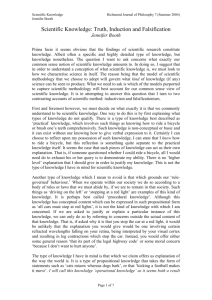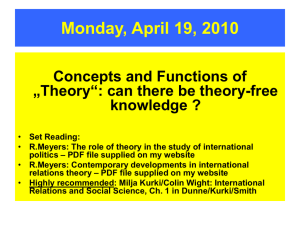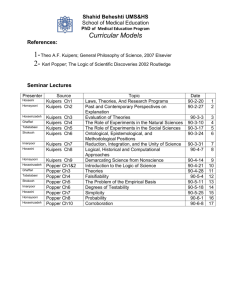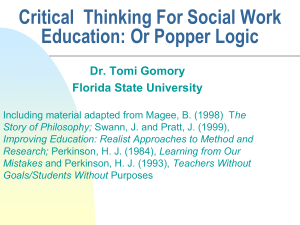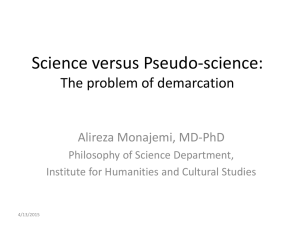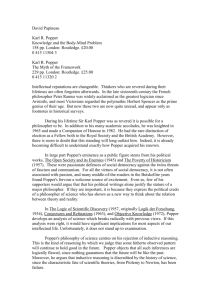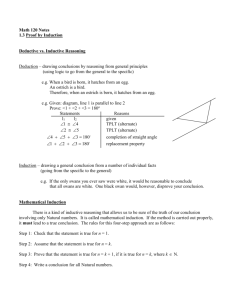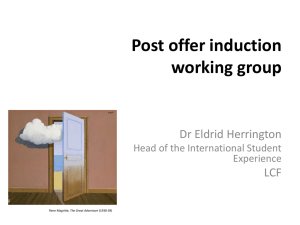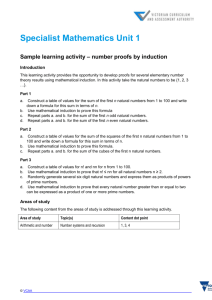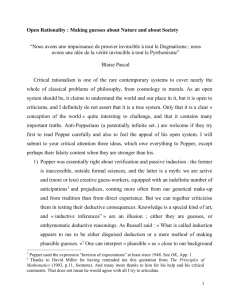Popper Self-Test Questions - Error Statistics Philosophy
advertisement
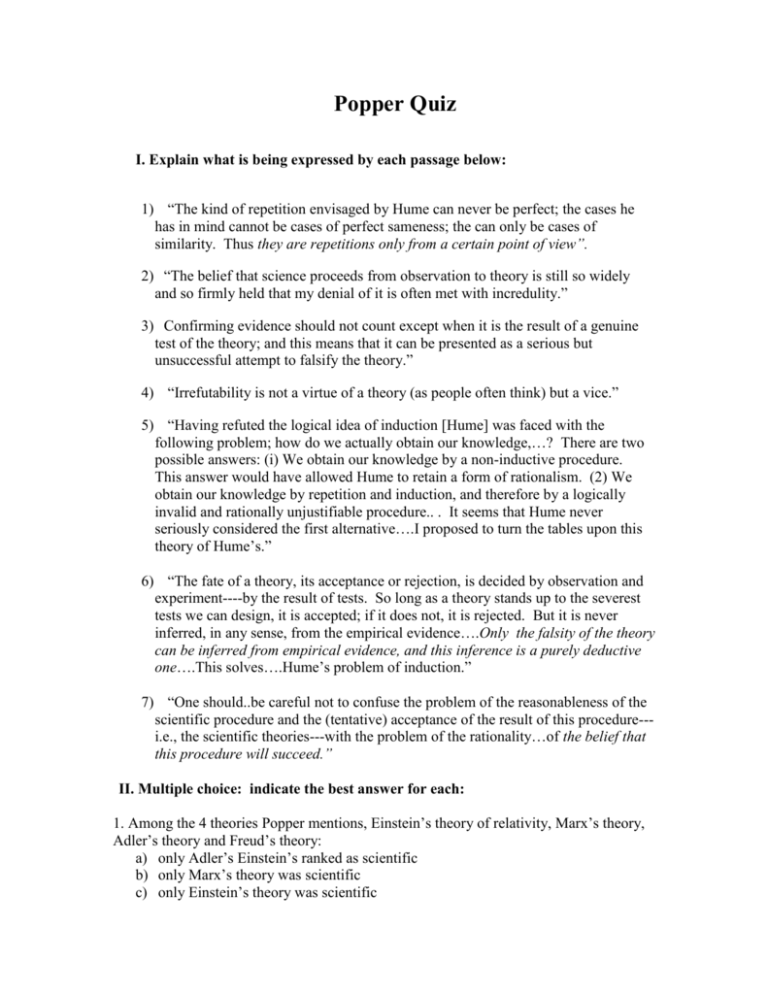
Popper Quiz I. Explain what is being expressed by each passage below: 1) “The kind of repetition envisaged by Hume can never be perfect; the cases he has in mind cannot be cases of perfect sameness; the can only be cases of similarity. Thus they are repetitions only from a certain point of view”. 2) “The belief that science proceeds from observation to theory is still so widely and so firmly held that my denial of it is often met with incredulity.” 3) Confirming evidence should not count except when it is the result of a genuine test of the theory; and this means that it can be presented as a serious but unsuccessful attempt to falsify the theory.” 4) “Irrefutability is not a virtue of a theory (as people often think) but a vice.” 5) “Having refuted the logical idea of induction [Hume] was faced with the following problem; how do we actually obtain our knowledge,…? There are two possible answers: (i) We obtain our knowledge by a non-inductive procedure. This answer would have allowed Hume to retain a form of rationalism. (2) We obtain our knowledge by repetition and induction, and therefore by a logically invalid and rationally unjustifiable procedure.. . It seems that Hume never seriously considered the first alternative….I proposed to turn the tables upon this theory of Hume’s.” 6) “The fate of a theory, its acceptance or rejection, is decided by observation and experiment----by the result of tests. So long as a theory stands up to the severest tests we can design, it is accepted; if it does not, it is rejected. But it is never inferred, in any sense, from the empirical evidence….Only the falsity of the theory can be inferred from empirical evidence, and this inference is a purely deductive one….This solves….Hume’s problem of induction.” 7) “One should..be careful not to confuse the problem of the reasonableness of the scientific procedure and the (tentative) acceptance of the result of this procedure--i.e., the scientific theories---with the problem of the rationality…of the belief that this procedure will succeed.” II. Multiple choice: indicate the best answer for each: 1. Among the 4 theories Popper mentions, Einstein’s theory of relativity, Marx’s theory, Adler’s theory and Freud’s theory: a) only Adler’s Einstein’s ranked as scientific b) only Marx’s theory was scientific c) only Einstein’s theory was scientific d) only the two psychological theories were unscientific 2. What bothered Popper about certain theories and what made them pseudoscientific in his eyes may be traced to their lack of a) explanatory power b) precision c) inductive warrant d) testability 3. Which of the following best describes Popper's position? (a) It is true that we cannot justify induction, but we can still show science to be rational by recognizing that no prediction can be derived without the use of auxiliary theories. (b) It is true that we cannot justify induction, but we can still show science to be rational by providing it with a logic of confirmation based upon inductive probability. (c) It is true that we cannot justify induction, but we can still show science to be rational by recognizing that it does not use induction, but rather relies on the reasonable method of conjecture and refutation (by deductive falsification). (d) It is true that we cannot justify induction, but we can show that our belief in any particular law is justified by the fact that it has held in so many different cases in the past. 5. The point that Popper is making by means of his experiment with a group of physics students in Vienna: “Take pencil and paper; carefully observe, and write down what you have observed!” is best stated as: (a) observation, while resting upon assumptions of care and detachment, are our most reliable foundations for empirical science. (b) the empirical method is inductive, proceeding from observation and experiment. (c) good scientists have the moral responsibility to be passive and detached while observations impress themselves on their unbiased minds (d) observation is always selective and makes sense only as related to interests, needs and problems. 6. According to Popper, it is rational to accept theories tentatively if our critical efforts to falsify them are unsuccessful because (a) theories which have stood up to critical scrutiny are likely to continue to be reliable (b) there is no more rational course of action open to us (c) such theories are probably true (d) we are psychologically incapable of doubting such theories 7. Popper is critical of Adler’s reference to his “thousandfold experience” in explaining the behavior of a child because a) Popper felt that Adler’s thousandfold positive instances only showed he could interpret cases as fitting his theory. b) Popper doubted Adler’s experience could have given him as many as a thousandfold positive instances c) One would require infinitely many positive instances of Adler’s sort, a thousandfold would not suffice d) Popper felt that Adler suffered from an Oedipal complex that encouraged failed attempts to rescue drowning children. III. ESSAY Choose either (i) or (ii) as the basis from which to write a clear, wellorganized essay. Use the passages as a springboard for an essay. Do not assume your reader knows the points or terms involved—of course, you can’t explain them all, but you’re your job is to show mastery of the ideas and explain and analyze them carefully. Length: approximately 1 page. A. Popper on solving the problem of induction (i) “Having refuted the logical idea of induction [Hume] was faced with the following problem; how do we actually obtain our knowledge,…? There are two possible answers: (i) We obtain our knowledge by a non-inductive procedure. This answer would have allowed Hume to retain a form of rationalism. (2) We obtain our knowledge by repetition and induction, and therefore by a logically invalid and rationally unjustifiable procedure…It seems that Hume never seriously considered the first alternative….I proposed to turn the tables upon this theory of Hume’s.” B. Responding to a Critic of Popper: Critic: According to Popper, “Repeated observations and experiments function in science as tests of our conjectures or hypotheses, i.e., as attempted refutations.” And when these experiments yield positive instances of the hypothesis or generalization in question, then our theories survive these attempted refutations, i.e., they “corroborate” the theory. But then positive instances serve for Popper just as they do for the inductivist! Popper may call positive instances “corroborating” rather than “confirming” hypothesis H, but this is just a different word to describe the same thing as the inductivists! Popper hasn’t avoided induction after all! Explain as fully as you can each of the points behind this criticism (first half of essay), then go on to mount, using just what you know from having read and discussed Popper, a strong response from Popper. The entire essay could be from Popper’s “voice”, i.e., first he explains very fairly what his critic is claiming, and then he goes on to respond to that critic. Thumbnail sketch of terms from Popper readings and discussion. (These are not full definitions but brief reminders of what these terms refer to, for purposes of review) 1. problem of demarcation: specifying when a theory should be ranked as scientific Identifying a criterion for a theory to attain the status of science as opposed to non-science or pseudo-science. 2. empirical method: method of inquiry using observation and experiment 3. (simple) induction, induction by enumeration: inferring from observed A’s that have been B’s to a claim that all, most, or the next A will be a B (or probably will be) 4. positive instance of a generalization or law: If the law is “all A’s are B’s, a positive instance is a case of an A that is also a B. e.g., a positive or confirming instance of “All swans are white” would be a case of a Swan that is white, e.g., Sa and Wa 5. negative instance of a generalization or law: If the law is “all A’s are B’s, a negative instance is a case of an A that is not a B. a negative or disconfirming instance of “All swans are white” would be a case of a Swan that is not-white (perhaps it’s yellow); it may also be called an “anomalous instance” for the law, e.g., Sa and not-Wa 6. (deductive) falsification of a generalization (by modus tollens) Example 1: If H: all swans are white, then E: the next swan will be white Not-E (i.e., Sally the swan is yellow) Not-H (falsify or refute H, infer H is false) Example 1 has the form of modes tollens, a valid deductive argument form. H entails expected outcome E, not-E is a negative instance of H which allows inferring deductively that H must be false, i.e., falsifying H. Since H “predicts” E, not-E is a failed prediction or anomaly for H. 7. An “ad hoc” way of saving H from falsification (“exception barring”): a way of retaining H in the face of an anomaly, negative instance, or failed prediction, by either redefining terms, or specially developing some background claim that has no “independent support”---it is developed solely as a way to avoid falsifying H, and is not itself testable or has not been tested at the time it is used to save H. Example 1: One might retain H: all swans are white, by insisting that Sally is not really a swan. Example 2: Let H be: All couples who have cohabited for at least 1 year before marriage remain married for at least 5 years. Two negative instances of H: Sally and Bob cohabited for at least 1 year before marriage but did NOT remain married for at least 5 years (they divorced, say, after 2 years). Jim and Jill cohabited for at least 1 year before marriage but did NOTremain married for at least 5 years (they divorced, say, after 6 months). Ad hoc save of H: H is true, except for the cases of Sally and Bob and Jim and Jill. Give another example of an ad hoc save of H. 8. critical attitude: ‘scientific attitude’: insistence on subjecting claims to test in order to probe possible errors; contrasts with dogmatic (pseudoscientific) attitude. deductive logic is important for the critical approach, not for “justifying” claims, not for proving hypotheses or theories are highly confirmed or probable, but to discover what out theories imply in order to criticize them effectively—to look for their weak spots, severely test them. 9. severe test or serious criticism of H: subject H to a searching probe of possible errors, especially by looking for predictions that would be very surprising, unexpected, or improbable assuming H is false and rivals to H true. e.g., GTR is thought to have been subjected to a (Popperian) severe test by E: the deflection of light prediction.

